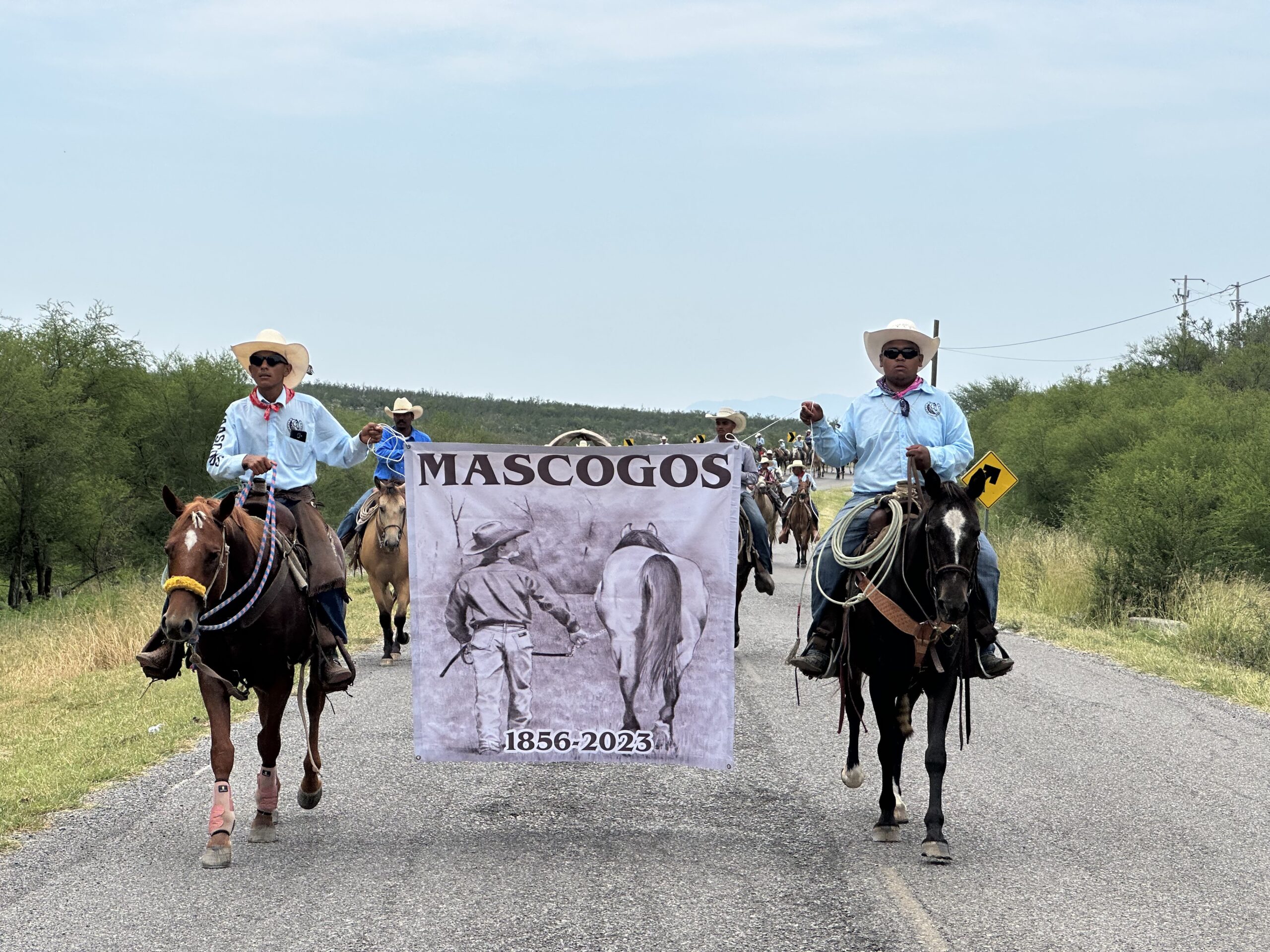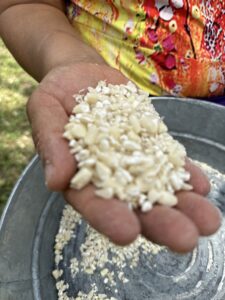get these nets
Veteran
*food discussion begins @29 minutes

A procession in Nacimiento.
With origins in Galveston, Juneteenth – the federal holiday commemorating the end of slavery – has long been celebrated by Black Americans across Texas. The day engages with Black American culture, from historical reenactments to large cookouts. But Black Americans aren’t the only ones who celebrate Juneteenth. Taco journalist Mando Rayo was curious – what about Black Mexicans?
It makes sense. Before Texas was Texas, it was Mexico; before it was Mexico, it was – and still is – Indigenous land. “I think for me as a Latino, just thinking about the intersection between, you know, Mexicanos and Black and Indigenous populations and also like some of those things that we don’t like to talk about…” Rayo notes. “And through these stories, I hope that we can learn and go beyond what was taught to us.”
Mascogos are descendants of Black Seminoles who escaped from slavery in the mid-1800s and settled primarily in Coahuila, Mexico. After learning about this history, Rayo spent two episodes of Tacos of Texas tracing the history and foodways of Black Seminoles across the region.
“Black Seminole leader John Horse and about 180 Black Seminoles staged a mass escape in 1849 to northern Mexico, where slavery had been abolished 20 years earlier,” Rayo shares. “The Mexican government welcomed the Seminole allies as border guards on the frontier, and they settled in Nacimiento, Coahuila. I don’t know about you, but I wasn’t taught this in school.”
Rayo began learning the history of Black Seminoles with the help of Windy Goodloe and Corina Torralba Harrington of the Seminole Indian Scout Cemetery Association in Brackettville, Texas. Goodloe, the secretary of the Seminole Indian Scout Cemetery Association, has deep roots within the town of around 2,000 people. Though the population is sparse, Brackettville is revitalized when Juneteenth comes around.
“Juneteenth, for us, is different in a way,” Goodloe explains. “We celebrate Juneteenth in solidarity with our Black brethren, although we were already free. We understand because of the travels of the Black Seminole, we as a people understand what freedom means.”
For Goodloe, Juneteenth isn’t just about the cookouts or the parade – it’s about embracing the connection between her and her loved ones’ Black Seminole heritage. She tells the Tacos of Texas podcast that that connection tethers people between Brackettville and Nacimiento. “These are our kinfolk,” Goodloe expresses. “[You’re] immediately embraced.”
The next day, Rayo ventures south to Nacimiento in Coahuila, Mexico, to meet with Torralba, the treasurer of the Seminole Indian Scout Cemetery Association. Though she lives in San Antonio, every Juneteenth she returns to Nacimiento for what feels like a big reunion.
“We have people that live around in Múzquiz and around other little towns in Mexico that come into Nacimiento for the celebration,” Torralba recalls. The days are stacked – a cabalgata, a baile, and of course… food!

Corn used to make sofkee. Tacos of Texas
Rayo finds familiar flavors throughout the celebrations – frijole rancheros, empanadas de la calabacita, and even potato salad. One dish that exists both in Mexico and stateside is sofkee. Derived from the Creek word safke or osafke, sofkee is a white corn-based soup cooked with ash originating from the southeast United States, the recipe traveling with the Indigenous peoples. Sweet and a tiny bit grainy, Rayo’s first taste instantly transports him to childhood, spooning his grandmother’s arroz con leche on a cold day.
This is the kind of familiarity that weaves together Texas, Mexican, and Seminole cuisines.
“Black Seminoles here in Nacimiento are really kind of holding onto their roots,” Rayo says. “Even though they may not know the dates or how the celebration came to be, they have that pride in being negros mascogos.”
The cross-border cultural heritage of Black Seminoles can be found in cuisine
Mascogos descended from Black Seminoles who escaped slavery in the U.S. While many live in Mexico, they still celebrate events like Juneteenth.
November 1, 2023
A procession in Nacimiento.
With origins in Galveston, Juneteenth – the federal holiday commemorating the end of slavery – has long been celebrated by Black Americans across Texas. The day engages with Black American culture, from historical reenactments to large cookouts. But Black Americans aren’t the only ones who celebrate Juneteenth. Taco journalist Mando Rayo was curious – what about Black Mexicans?
It makes sense. Before Texas was Texas, it was Mexico; before it was Mexico, it was – and still is – Indigenous land. “I think for me as a Latino, just thinking about the intersection between, you know, Mexicanos and Black and Indigenous populations and also like some of those things that we don’t like to talk about…” Rayo notes. “And through these stories, I hope that we can learn and go beyond what was taught to us.”
Mascogos are descendants of Black Seminoles who escaped from slavery in the mid-1800s and settled primarily in Coahuila, Mexico. After learning about this history, Rayo spent two episodes of Tacos of Texas tracing the history and foodways of Black Seminoles across the region.
“Black Seminole leader John Horse and about 180 Black Seminoles staged a mass escape in 1849 to northern Mexico, where slavery had been abolished 20 years earlier,” Rayo shares. “The Mexican government welcomed the Seminole allies as border guards on the frontier, and they settled in Nacimiento, Coahuila. I don’t know about you, but I wasn’t taught this in school.”
Rayo began learning the history of Black Seminoles with the help of Windy Goodloe and Corina Torralba Harrington of the Seminole Indian Scout Cemetery Association in Brackettville, Texas. Goodloe, the secretary of the Seminole Indian Scout Cemetery Association, has deep roots within the town of around 2,000 people. Though the population is sparse, Brackettville is revitalized when Juneteenth comes around.
“Juneteenth, for us, is different in a way,” Goodloe explains. “We celebrate Juneteenth in solidarity with our Black brethren, although we were already free. We understand because of the travels of the Black Seminole, we as a people understand what freedom means.”
For Goodloe, Juneteenth isn’t just about the cookouts or the parade – it’s about embracing the connection between her and her loved ones’ Black Seminole heritage. She tells the Tacos of Texas podcast that that connection tethers people between Brackettville and Nacimiento. “These are our kinfolk,” Goodloe expresses. “[You’re] immediately embraced.”
The next day, Rayo ventures south to Nacimiento in Coahuila, Mexico, to meet with Torralba, the treasurer of the Seminole Indian Scout Cemetery Association. Though she lives in San Antonio, every Juneteenth she returns to Nacimiento for what feels like a big reunion.
“We have people that live around in Múzquiz and around other little towns in Mexico that come into Nacimiento for the celebration,” Torralba recalls. The days are stacked – a cabalgata, a baile, and of course… food!

Corn used to make sofkee. Tacos of Texas
Rayo finds familiar flavors throughout the celebrations – frijole rancheros, empanadas de la calabacita, and even potato salad. One dish that exists both in Mexico and stateside is sofkee. Derived from the Creek word safke or osafke, sofkee is a white corn-based soup cooked with ash originating from the southeast United States, the recipe traveling with the Indigenous peoples. Sweet and a tiny bit grainy, Rayo’s first taste instantly transports him to childhood, spooning his grandmother’s arroz con leche on a cold day.
This is the kind of familiarity that weaves together Texas, Mexican, and Seminole cuisines.
“Black Seminoles here in Nacimiento are really kind of holding onto their roots,” Rayo says. “Even though they may not know the dates or how the celebration came to be, they have that pride in being negros mascogos.”
Last edited: